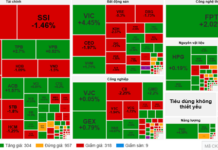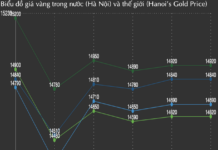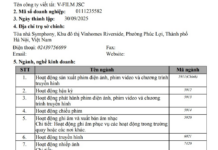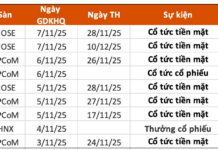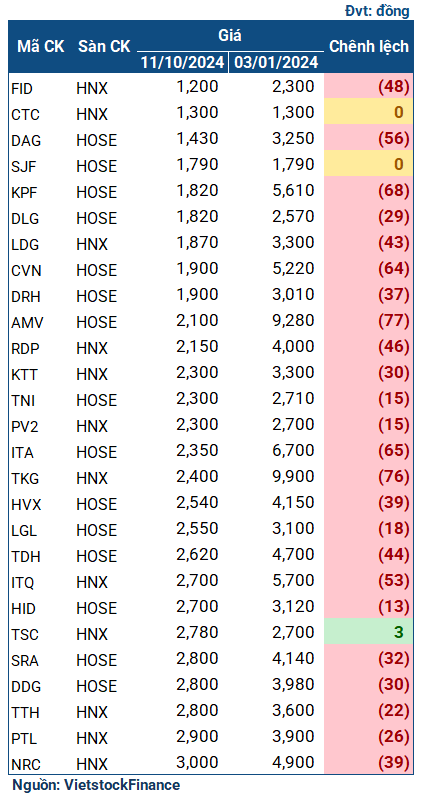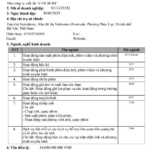
The ubiquitous iced tea, or “tra da” as it’s locally known, is a staple in Vietnam, offering a refreshing break from the tropical heat at a very affordable price. Typically, a glass of this humble beverage costs around 3,000 VND, which is roughly equivalent to a meager 12 cents. However, this price point serves as a stark reminder of the current state of the stock market.
At the time of writing, there are 27 stocks listed on the HOSE and HNX exchanges that are priced at or below this humble 3,000 VND threshold. The table below illustrates this, with the cheapest stock going for a mere 1,200 VND and the most expensive of this bunch peaking at 3,000 VND per share.
|
Stocks Cheaper than a Glass of Iced Tea
|
Topping this rather unfortunate list is FID, the stock code for Vietnam Enterprise Investments Corporation. As of November 10th, FID’s market price languishes at a mere 1,200 VND per share, reflecting a 48% decline since the beginning of the year. Following closely behind is CTC of the Tay Nguyen Hoang Kim Group, which has maintained a market price of 1,300 VND per share since the start of the year. Bringing up the rear, albeit still within the “tra da” price range, is NRC from the Danh Khoi Group, with a share price of 3,000 VND.
When it comes to the biggest losers in terms of percentage decline, AMV of Vietnam-America Pharmaceutical and Medical Equipment Production and Trading JSC, and TKG of Tung Khanh Production and Trading JSC take the dubious honors, with their share prices plummeting by 77% and 76%, respectively, since the start of the year. Other notable mentions include KPF of Koji Asset Investment JSC, trading at 1,820 VND per share after a 68% drop; ITA of Tan Tao Investment and Industry Corporation, priced at 2,350 VND following a 65% decline; and DAG of Dong A Plastic Joint Stock Company, trading at 1,430 VND after a 56% fall.
|
Stocks Trading Below 5,000 VND per Share
|
But what exactly is causing these stocks to trade at such bargain-basement prices? Well, it’s important to remember that stock prices are influenced by a multitude of factors, including a company’s fundamentals, business prospects, industry outlook, and the interplay of supply and demand in the market. However, more often than not, stocks that are excessively cheap tend to have deeper underlying issues.
Take FID, for example. The company’s stock is currently burdened with a combination of warnings, controls, and trading restrictions. Moreover, FID’s internal affairs are less than impressive, with a history of consecutive losses, the heaviest being a 4 billion VND loss in 2020. While FID managed to double its revenue in 2023 compared to the previous year, reaching over 84 billion VND, it still incurred a net loss of nearly 3 billion VND (compared to a meager profit of 64 million VND in 2022).
| FID’s Prolonged Streak of Losses |
This trend continued into the first half of 2024, with FID posting a net loss of 2.5 billion VND, bringing its cumulative loss as of the end of June to over 23 billion VND. The company’s 2024 semi-annual audited financial statements also received a series of qualified audit opinions, primarily related to provisions for personal advances and loan contracts with several joint-stock commercial banks.
FID’s Response to Continued Losses and Qualified Audit Opinions
Turning our attention to DAG, the situation is equally dire. DAG, much like FID, is mired in a quagmire of complications, currently facing its most challenging period in two decades. According to its 2023 audited financial statements (released in July 2024), DAG incurred a staggering loss of 600 billion VND, primarily due to a 404 billion VND provision for inventory devaluation, which significantly increased the cost of goods sold. This massive loss not only erased the company’s consistent profitability over the previous 16 years but also resulted in a negative retained earnings balance of 588 billion VND as of the end of 2023 (compared to a positive balance of 19 billion VND at the start of the year). The report also garnered three pages of comments from the auditors, highlighting bad debts—both in terms of loans and tax liabilities—and expressing doubts about the company’s ability to continue as a going concern.
The first half of 2024 brought little respite for DAG, as it posted a loss of 67 billion VND, with equity capital dwindling to just over 27 billion VND. The company’s revenue for this period stood at a mere 55 billion VND, a meager 6% of its revenue for the same period in the previous year. In a strange twist of fate, the suspension of trading for DAG’s stock could be considered a blessing in disguise, preventing its share price from plummeting further.
| DAG’s Massive Loss in 2023: The Toughest Period in Two Decades |
ITA, a company helmed by Ms. Dang Thi Hoang Yen (also known as Maya Dangelas), has also had its fair share of controversies. In late September 2024, ITA was placed under a trading suspension due to ongoing violations of information disclosure regulations. While ITA’s financial performance in recent times hasn’t been abysmal—after a record loss of 260 billion VND in 2022, the company bounced back with a net profit of over 202 billion VND in 2023, and in the first half of 2024, it posted a net profit of nearly 64 billion VND, a 66% increase year-over-year—its stock price has continued to plummet due to various scandals.
In 2022, for instance, the Ho Chi Minh City People’s Court ordered the initiation of bankruptcy proceedings against ITA, stemming from a debt of approximately 21 billion VND to Cong Ty TNHH Thuong Mai Dich Vu Xay Dung Quoc Linh. Ms. Yen has consistently denied the existence of this debt. This court ruling also triggered a slew of subsequent lawsuits, which continue to impact the company’s operations, as explained in ITA’s Q2 2024 financial statement disclosures.
| ITA’s Share Price in Freefall Since the Start of the Year |
ITA has also garnered attention for its controversial statements. Regarding the delay in publishing its 2023 audited financial statements and 2024 semi-annual reviewed financial statements, Mr. Nguyen Thanh Phong, CEO of ITA, alleged that HOSE and the State Securities Commission of Vietnam (SSC) engaged in abnormal practices, creating obstacles for auditing firms and leading to the suspension of auditors responsible for ITA’s financial statements. Ms. Yen, on the other hand, asserted that ITA was being targeted by malicious forces attempting a hostile takeover. In the face of potential delisting, ITA issued a statement implying that HOSE and the SSC would be held accountable.
Another notable stock in this “tra da” category is DDG of Indochine International Investment and Trade Joint Stock Company. Currently, DDG is under a trading warning and has recently been placed under control due to violations of information disclosure regulations regarding its 2024 semi-annual reviewed financial statements. As of October 11th, its share price stood at 2,800 VND, a 30% decline since the beginning of the year. However, compared to its peak in 2023, just before a spectacular 19-session losing streak, the drop is a staggering 93%.
| DDG’s Plummet from Peak in 2023 to “Tra Da” Territory |
The primary culprit behind DDG’s woes is the company’s struggle with operational challenges. In 2023, the company suffered a record loss of nearly 206 billion VND, a stark contrast to its 44 billion VND profit in the previous year. During the first half of 2024, DDG’s revenue amounted to just over 120 billion VND, a mere one-third of its revenue for the same period in the previous year. While the company did manage to eke out a net profit of approximately 6.6 billion VND (compared to a loss of nearly 194 billion VND in the first half of 2023), this was primarily due to the sale of fixed assets by the parent company.
| DDG’s Plunge: Operational Challenges Take Their Toll |
While optimistic investors often say that every rain eventually stops and that markets will eventually recover, the storm faced by shareholders of these companies is far from over.

